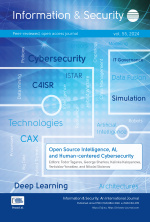Human Factor, Resilience, and Cyber/Hybrid Influence
Source:
Information & Security: An International Journal,Abstract:
The aim of this article is to depict some of the impacts of the ongoing digital transition on security, considering human factors, resilience, cyber and hybrid threats. After a short description of literature and related works, the article focuses on the term “security” to better clarify the meaning, then introduces the process of digital transition and related aspects including “datafication” and potential harms to cybersecurity and the potential resilience breaches due to the concentration of tasks based on digital technology including production chains and digital manufacturing.
Recently, the digital transformation has had a considerable impact on cybersecurity due to the boost generated by the pandemic and the increasing number of “digitally divided” citizens forced to “go digital” and related need to foster a culture of cybersecurity since the primary schools. This section includes an overview of different approaches to the “securitisation” of cyberspace. Back to security in a broad sense freedom of expression is the first aspect considered, including hate, fake news and propaganda, influence on opinion dynamics potentially applicable to the social and political sectors, as a kind of technological extension the combined use of big data and machine learning to activate nudging as a silent weapon, the risks directly connected to the concentration in few countries of online platforms directly connected with the last topic that is the emerging Internet of behaviour that thanks to the incredible amount of users’ data can monitor ad address citizens’ behaviours.
The list of impacts included will simply provide an idea about some of the potential threats, but they are not limited to this set.
